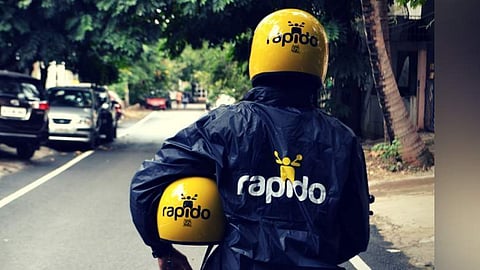

Ride-sharing app Rapido, which has quickly become a significant player in India's passenger aggregation space, particularly in the two-wheeler segment, is now strategically looking to expand into the food delivery business as its next phase of growth.
The company, currently in talks with restaurateurs in select cities, is expected to adopt a subscription model with its partners—setting itself apart from existing players like Zomato and Swiggy, according to a couple of sector experts.
Founded in 2015 as a bike-taxi platform, Rapido has rapidly risen to the second spot in India’s ride-sharing market. Having surpassed $1 billion in annualized gross merchandise value (GMV), the company now views food delivery, a growing market, as the most strategic avenue for its next phase of expansion.
A report by The Economic Times on Wednesday suggests that Rapido's discussions with restaurateurs are still in the early stages.
"These are initial talks to assess whether Rapido can challenge the Zomato-Swiggy duopoly. The company already offers delivery services for individual restaurants using its two-wheeler fleet," an unidentified source familiar with the development told the publication.
According to industry sources, Rapido has the potential to challenge Zomato and Swiggy, given its reach and the strategic model it could adopt as the latest entrant in the country’s fast-growing food delivery market, although its plans have yet to be finalised.
Interestingly, Rapido already provides food delivery services on behalf of Swiggy, which is an investor in the ride-sharing startup. However, the report highlights that there is no exclusivity clause in Swiggy’s investment in Rapido, leaving the door open for the company to expand its own food delivery services.
Currently operating in 100 cities, Rapido has an ambitious expansion plan, aiming to reach 500 cities across India by 2025. This expansion follows a successful fundraising round in February, in which the company raised $30 million from Prosus, a Dutch investment firm. This was preceded by a $200 million funding round led by WestBridge Capital, which boosted Rapido’s valuation to an impressive $1.1 billion.
The company’s growth trajectory is evident in its daily ride volumes. In November, Rapido was averaging around 2.6 million rides per day, but that number has since risen to between 3.2 and 3.5 million. While the majority of these rides still rely on its bike-taxi service, the number of auto-rickshaws and four-wheeler cabs on the platform is steadily increasing. This growth is largely attributed to Rapido’s innovative subscription-based model for gig workers and drivers, which allows them to access the platform and its users for a daily or weekly fee, rather than paying a commission on each ride.
Rapido's decision to enter the food delivery market comes at a time when the segment is experiencing slower growth. This slowdown has been linked to systemic issues, including disagreements between restaurateurs and aggregators over commission rates. Zomato’s founder, Deepinder Goyal, has publicly acknowledged these challenges, which have created friction within the industry.
Despite these challenges, Rapido's experience in managing delivery logistics through its two-wheeler fleet could give it an edge in providing cost-effective and efficient solutions to restaurant partners. If it succeeds in entering the food delivery market, Rapido could offer an alternative to the high commission rates charged by existing platforms, which may appeal to restaurateurs seeking a better deal.
As Rapido continues to grow and diversify, its foray into food delivery could reshape the competitive landscape, particularly if it succeeds in challenging the dominance of Zomato and Swiggy. However, with discussions still in the early stages, it remains to be seen whether the company can turn this ambition into a viable and sustainable business model.